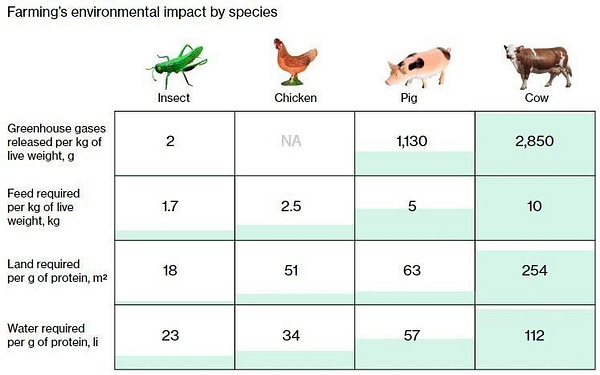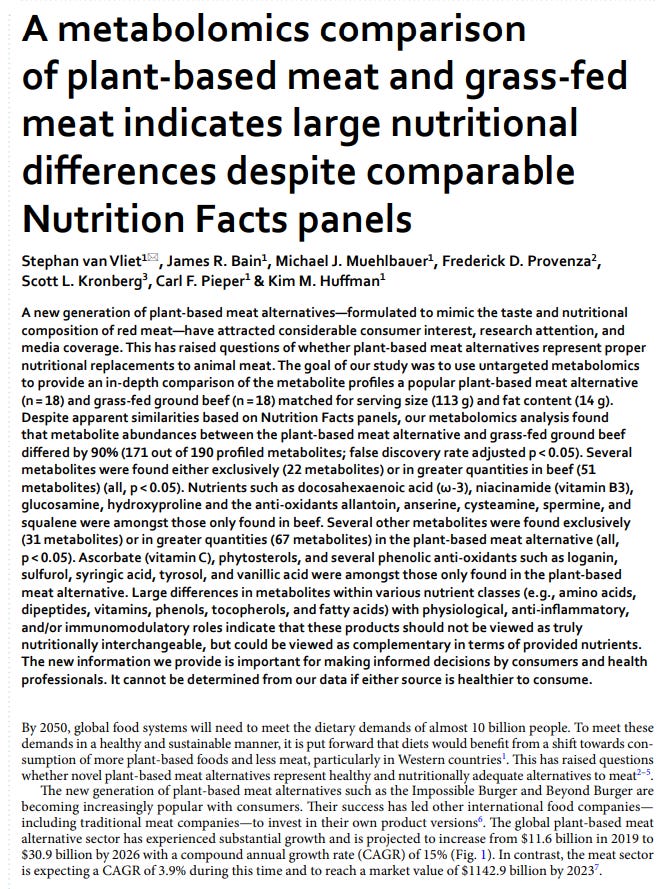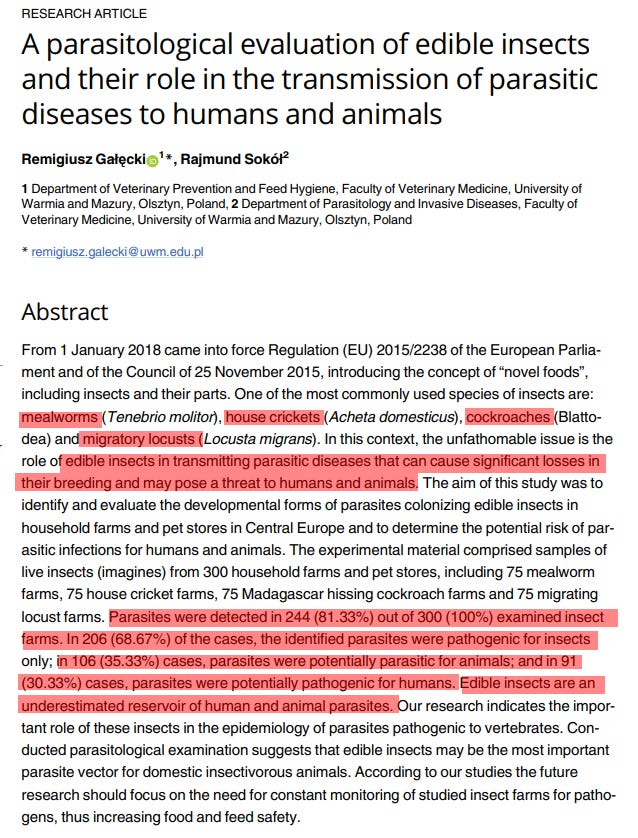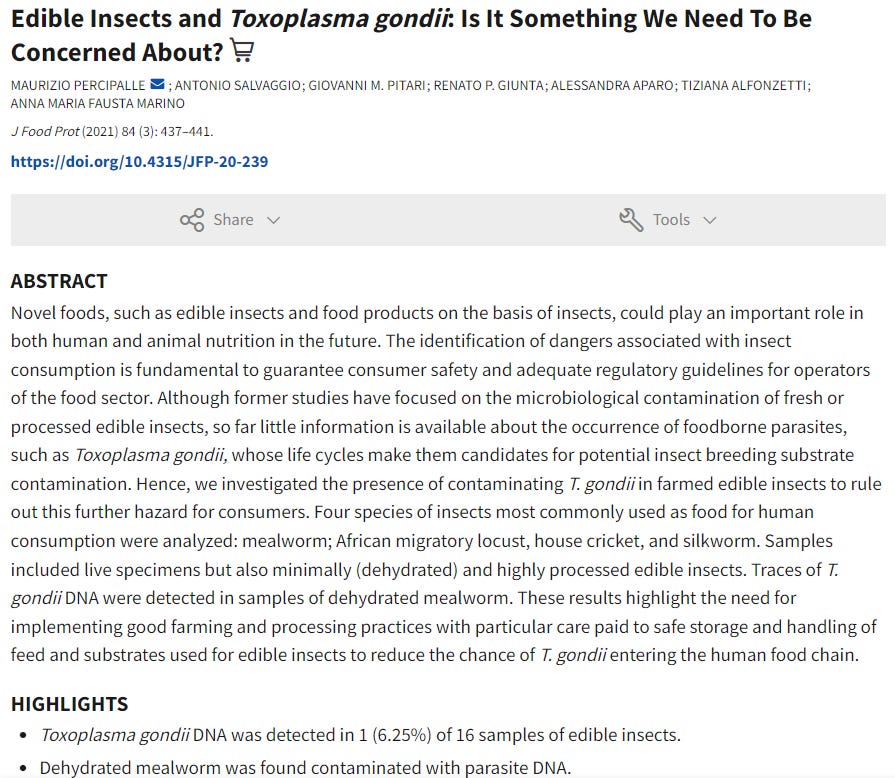Insects Contain A Structural Component In Their Exoskeletons Called Chitin Which is Toxic To Humans

Exactly What Is Behind The UN & WEF Insects as Food Agenda?
LewRockwell
The two most prominent One World Government nodes in the UN and WEF have been aggressively pushing the bug food agenda for close to a decade now; to wit:

World Economic Forum @wefGood grub: why we might be eating insects soon wef.ch/2LiLmjQ #food

October 14th 2018
A 2013 article from the United Nations website:
The latest buzz: eating insects can help tackle food insecurity, says FAO
The book, Edible Insects: future prospects for food and feed security, stresses not just the nutritional value ofinsects, but also the benefits that insect farming could potentially have on the environment and on addressing the rapidly increasing demand for food worldwide.
Become a paid subscriber: support the “Do NOT comply.” It’s 8 cents a day.
Last year from the WEF’s website:
Why we need to give insects the role they deserve in our food systems
- By 2050, the world's food supply will need to feed another 2 billion people;
- Insect farming for food and animal feed could offer an environmentally friendly solution to the impending food crisis;
- A source of protein and fertilizer, emerging technologies could help bring insects back into the food system at scale.
The CIA-run Hollywood and MSM have been deployed to normalize the insect as food agenda. Cult puppet and Rockefeller asset Bill Gates is also pushing this bug grub scheme which perfectly gibes with all things eugenics, DEATHVAX™ and technocratic dystopia.
All of this slots perfectly into Agenda 21, Agenda 2030 and the Club of Rome’s longstanding PSYOP-CLIMATE-CHANGE.
So why bugs?
What exactly is it in these alleged “sustainable” high protein “food” sources that makes them so important to the Cult’s agenda?
Insects contain a natural structural component in their exoskeletons called chitin. This fibrous polysaccharide happens to be extremely toxic to humans. Specifically, chitin triggers inflammation and immune responses; to wit:
Chitin, a potential allergy-promoting pathogen-associated molecular pattern (PAMP), is a linear polymer composed of N-acetylglucosamine residues which are linked by β-(1,4)-glycosidic bonds. Mammalians are potential hosts for chitin-containing protozoa, fungi, arthropods, and nematodes; however, mammalians themselves do not synthetize chitin and thus it is considered as a potential target for recognition by mammalian immune system. Chitin is sensed primarily in the lungs or gut where it activates a variety of innate (eosinophils, macrophages) and adaptive immune cells (IL-4/IL-13 expressing T helper type-2 lymphocytes). Chitin induces cytokine production, leukocyte recruitment, and alternative macrophage activation.
This sounds similar to some of the spike protein effects. It also sounds like this chitin is the kind of pathogen that could easily exacerbate VAIDS.
The conclusion in the research study entitled, Chitin and Its Effects on Inflammatory and Immune Responses is rather measured considering the various deeply troubling findings:
The significance of chitin and its derivatives on immune responses has not been fully appreciated. Such responses are reflection of not only chitin but also chitinases and chitinase-like proteins during natural or experimental exposure, each with their own mechanisms to induce and regulate immune responses. There are many aspects of chitin-immune system interactions which are not thoroughly understood yet.
Perhaps the interactions are in fact understood well enough by the UN, WEF, Gates, et al. as the mechanisms of the DEATHVAX™ spike proteins have been well understood well before the rollout of PSYOP-19.
In a rat study to determine if chitosan, a linear polysaccharide that is made from chitin, is safe to consume the following was found:
There were no histologic changes associated with the observed decreases in vitamin levels; however, the decreases were significant enough to suggest nutritional inadequacies. The longterm effects of vitamin A and vitamin E deficiencies are well-known60-63, and it is unknown what deficiency-related effects would have been observed had these decreased levels been maintained for a longer period of time. When circulating levels of vitamin E, specifically α-tocopherol, are depleted, tissue damage can occur. Vitamin E depletion in humans has subsequently been correlated with anemia, disruption of normal growth, decreased responses to infection, and Chitosan, NTP TOX 93 30 pregnancy concerns62 . Vitamin A is essential in numerous biological processes and pathways, including growth, vision development, immune function, and metabolism. Severe vitamin A deficiency (VAD) results in disruption of normal tissue function and is associated with childhood blindness, anemia, and depressed responses to infection; VAD during a severe infection may result in death61-63 . While the long-term effects of vitamin deficiency in rodents are not as well understood, the available literature on human deficiencies suggests that the decreases in vitamin A and E observed in this study may be detrimental over time.
Basically, consuming insects over time will result in depletion of vitamins. Humans exposed to Modified mRNA gene therapy injections are all in varying degrees afflicted with DEATHVAX™-induced VAIDS, and will be especially susceptible to chitin-rich diets.
The study also reveals the following:
The absolute and relative thymus weights of 3% and 9% males and 9% females were also significantly decreased relative to those of control groups. The thymus is extremely sensitive to toxic compounds and similar stressors, and alterations in thymus weight can be an indicator of apoptosis and organ atrophy in response to a toxic insult.
This establishes that chitin or chitosan-rich diets are toxic, and could potentially result in the slow death of organs.
And if that were not enough:
Therefore, it is possible that chitosan exposure may have induced the increased rate of seizures observed in this study.
A study published in Nature entitled, Chitin induces accumulation in tissue of innate immune cells associated with allergy showed that chitin triggers allergic airway inflammation and possibly asthma:
Chitin is the second most abundant polymer in nature, providing the osmotic stability and tensile strength to countless cell walls and rigid exoskeletons. Reese et al. have now found that mice treated with chitin develop an allergic response, characterized by a build-up of interleukin-4 expressing innate immune cells. Treatment with a chitinase enzyme abolishes the response. Occupations associated with high environmental chitin levels, such as shellfish processors, are prone to high incidences of asthma, suggesting that this pathway may play a role in human allergic disease.
What would happen to a person that is suffering from COVID and/or the DEATHVAX™ if they were on an insect heavy diet?
What would happen to a person that developed asthma, inflammation, immunocompromisation, vitamin depletion, etc. from an insect heavy diet if they contracted COVID and/or received a spike protein inducing injection?
Clearly, the psyops flow into and out of each other.
Altering diet in conjunction with never-ending Modified mRNA injections would certainly over time increase depopulation, especially when the insects are genetically modified as are their eaters.
Insect-rich diets could very well have SADS endings.
And its always the same elitist cabal of usual suspects pushing the very same agendas for their 4th Industrial Posthuman Technocommunist Revolution.
Do NOT comply.
EDIT: thanks to this substack’s subscribers:
Disgenics via microbiome manipulation. Literally.
Madagascar hissing cockroach farms and 75 migrating locust farms. Parasites were detected in244 (81.33%) out of 300 (100%) examined insectfarms. In 206 (68.67%) of the cases, the identifiedparasites were pathogenic for insects only; in 106 (35.33%) cases, parasites were potentially parasitic for animals; and in 91 (30.33%) cases, parasites were potentially pathogenic for humans.
Edible insects are an underestimated reservoir of human and animal parasites. Our research indicates the important role of these insects in the epidemiology of parasites pathogenic to vertebrates. Conducted parasitological examination suggests that edible insects may be the most important parasite vector for domestic insectivorous animals.
Breads Made of Powdered Crickets May Be Loaded with Bacterial Spores
If bread made from powdered crickets isn't gross enough for you, this article won't help: A new study from Italy finds that breads made with powdered crickets may be loaded with potentially dangerous bacterial spores.
It seems the problem of chitin has been known for years. I found a 2017 study entitled, "Lowering Chitin Content of Cricket ( Gryllus assimilis) Through Exoskeleton Removal and Chemical Extraction and its Utilization as a Ruminant Feed"...
"Background and objective: Cricket contains high crude protein level but it also contains considerable amount of chitin that may impede nutrient digestion and decrease production performance of animal [sic]."
IE, efforts are underway to get remove the cricket chitin because farm animals get tummy-aches and worse. People OTOH are being told it's "good for your digestion."
But brace yourself... there's more. Crickets can introduce new diseases all by themselves. This from a 2021 study:
"Insects generally have high reproductive rates leading to rapid population growth and high local densities; ideal conditions for disease epidemics. The parasites and diseases that naturally regulate wild insect populations can also impact when these insects are produced commercially, on farms. While insects produced for human or animal consumption are often reared under high density conditions, very little is known about the microbes associated with these insects, particularly those with pathogenic potential.... his will become particularly relevant as-and-when cricket rearing facilities scale up and transform from producing insects for animal feed to producing insects for human consumption."
NOTE: that was published in May 2021. Entomo Farms (formerly Next Millennium Farms) in Canada was founded in 2014, and by Jan. 2021 it was already raising crickets crowded by the millions into a warm, humid enclosed space of 60,000 sq. ft. After 6-8 weeks they are harvested. No mention of checking insect health during that time. In short, they're using the same caution in producing 'healthy' cricket 'food' as they did in producing 'safe and effective' mRNA 'vaccines'.
by John Paul
Edible insects, parasites, microbiome
Part II of yesterday's post is coming tomorrow, had to attend a meeting today with a friend. Nonetheless, I think long-term this is fairly important.
It has been known for quite a while there is a massive push for planetary dietary change, steering the majority of the world’s population from animal protein to different forms of synthetic protein. One favored by many of the ones pushing this change under different agendas is plant-based. If anyone ever annoys you about plant-based protein, just show them this. Plant-based will never have the same nutritional value as animal protein, regardless of how much they “add” or gene edit it.

The other, dare I say more nefarious from my perspective, is bug-based everything. Being vehemently against synthetic forms of protein it never crossed my mind to check for the following. This was brought to my attention myZack Vorhees, aka Perpetual Maniac, came to fame when he decided to whistleblow Google meddling with many aspects of society.

Parasites were detected in 81% of the sample, and at least 30% are known to be potentially harmful to humans. There is a whole section on each type of parasite that could be harmful to humans in the paper. Quite a few of these usually affect the lungs and the gut. Thankfully we haven’t been through a pandemic with a respiratory virus known to attack both the gut and lungs.

In fact, after this was brought to my attention, merely spending 30 minutes in any academic search engine will get you dozen or so results going back almost 10 years on the concern about the safety of edible insects. There will be an ever-growing push to force people out of normal diets and into synthetic ones.
And given the last two years and how concerned governments were with experimental vaccines, do you really think they will oppose this or have any safety concerns at all ?
Parasites have a very distinct and powerful effect on the gut, and the microbiome.
Together, these observations suggest that parasites can serve as ecosystem engineers for gut microbes by altering the physical landscape in which they reside. Moreover, current evidence suggests that the type of effects observed may broadly differ between parasitic helminths and protozoa. While helminths can promote barrier function and limit bacterial translocation, virulent parasitic protozoa may often have the opposite effect, degrading barrier function and allowing closer interaction between bacteria and the epithelium. This contrast is illustrated by the suite of interactions between the microbiota and two types of parasites—Trichuris spp. nematodes and the protozoan parasite T. gondii—many of which are known or thought to involve changes to epithelial barrier functionGiven everything we know so far about [Flu]SARS-CoV-2, you tell me if eating parasite-ridden bugs is a great idea ? Not that anyone care, they will push it hard anyway.
Original Article: https://www.lewrockwell.com/2022/08/no_author/exactly-what-is-behind-the-un-wef-insects-as-food-agenda/
[Truth11.com Edit]





Comments ()